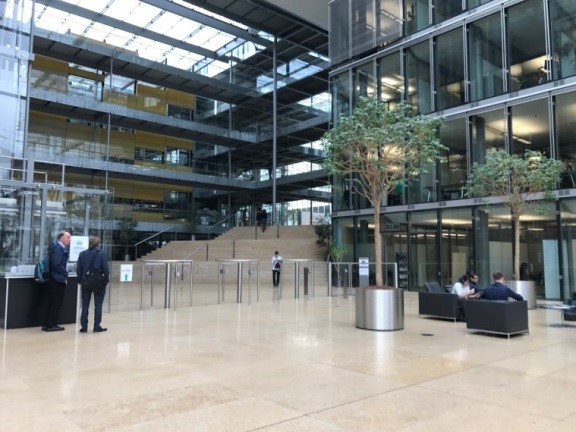20 Oct 2017
Conference report: second international conference on clinical metagenomics
The Second International Conference on Clinical Metagenomics (ICCMg2) was held in Geneva, Switzerland, on the 19th and 20th of October 2017. The conference aimed to share recent developments in clinical metagenomics from a broad range of perspectives, including infectious diseases, antimicrobial resistance, bio-informatics and microbiota, with a focus on the translation of clinical metagenomics to routine clinical settings.
Dr Andre Mu and Dr Jason Kwong represented the Microbiological Diagnostic Unit Public Health Laboratory (MDU PHL) at the conference, and Dr Mu has summarised his experience of the conference below:

Conference venue Campus Biotech, Geneva
It’s 10 o’clock Thursday morning in Geneva, Switzerland. We walk into a grand building, which I can only describe as “Gattaca-esque”; with glass, waist-height, rotating bollards that blankly flash “in-valid” and deny entry if you don’t present the swipe card for an awkwardly long period of time
Representing MDU PHL, Jason Kwong and I presented a poster on the “Culture-independent reconstruction of extensively drug-resistant pathogen genomes for surveillance and outbreak investigation through metagenomic sequencing” (poster available here). The two-day conference featured keynote seminars from the likes of, Laurent Farinelli (Geneva), Steve Miller (UCSF), Charles Chiu (UCSF), and Gautam Dantas (WU), discussing the applications of metagenomic sequencing and bioinformatic analyses for clinical purposes.
Several key themes emerged from the conference, which highlighted a concerted effort towards automatised metagenomics for diagnostics systems. Laurent Farinelli recounted the key developments in next-generation sequencing during the past decades, and predicted the promised possibilities, such as quicker turn-around-times, and greater sensitivity in pathogen detection through advancing technologies. However, Phillipe Lemercier stressed the importance of curated databases, for “no matter the quality of the sequencing, the results can be blurred by faulty databases”. Furthermore, clear validation and proficiency testing against benchmarked datasets (and ethics) is required before clinical metagenomics can be accredited as a routine diagnostic test.
It was refreshing to hear that while there is a need to facilitate new technologies, it is also important to consider patient health outcomes. For example, how will patient information help identify, determine, and link antimicrobial resistance (AMR) genotypes with AMR phenotypes, and (ultimately) guide patient treatment? Gautam Dantas, of the Washington University School of Medicine, also stressed the importance from a research perspective in understanding the transmission of AMR genes, particularly through environmental ecosystems (such as soils and water systems), and the role this plays in facilitating the emergence of resistance genes.
Current efforts driven by MDU PHL and Doherty Applied Microbial Genomics aim to address some of the outstanding issues in this field, and to develop local expertise towards implementing metagenomics across clinical, public health, and basic microbiology. Current research projects include:
- Clinical diagnosis using a suite of different sample types, including blood, CSF, BAL, and faeces
- Linking metagenome-derived genomes (e.g. KPC) to transmission networks
- Characterizing hospital microbiota
- Reconstructing the genome of Treponema pallidum (in collaboration with VIDRL)
- Detecting AMR genes in waste waters
- Elucidating the role of perturbed microbiomes in enhanced gut colonization with antibiotic resistant pathogens (e.g. VRE)
- Collaborations with immunologists from the University of Melbourne Department of Microbiology and Immunology (DMI) on understanding the role skin and gut microbiota play in the development of key immune cells
Through recent fellowship awards, Jason Kwong (2018 NHMRC Early Career Research Fellowship) will be developing a national framework for clinical metagenomics, and I (2018 Endeavour Research Fellowship) will collaborate with Professor Rob Knight (University of California San Diego) to research gut, skin, and environmental microbiomes.
Author: Andre Mu (MDU PHL)


